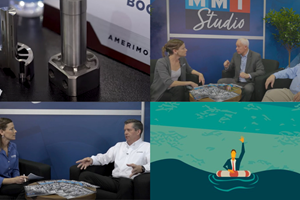The Bottom Line: Weathering the State Tax Nexus Storm
Under this concept, a company has sufficient physical presence in a state for that state to subject that company to taxes.
Companies searching for revenue wherever they can and states looking to increase tax revenue create the elements of a perfect storm. The geographic footprint for many companies has been growing and often expands into several states or even countries. Meanwhile, states have been increasingly aggressive in taxing companies that are not located within that state. This issue is not unique to mold builders. It spans every industry and continues to affect business decisions.
You may recall Phil Michelson coming under fire a few years ago for evaluating whether it made sense to move out of California due to its high income tax rate. Rival Tiger Woods quickly came to Michelson’s defense, indicating that was a significant factor in his decision to move to Florida in 1996. While mold builders may not have the luxury that professional golfers enjoy with respect to where they practice their trade, the same financial concerns apply.
Interestingly, it may be beneficial for a company to be subject to tax in other states. If your company is located in a state with relatively high tax rates, you may have a lower overall tax burden if the company pays tax elsewhere or if you are a shareholder living outside of the state where the company operates.
This concept is known as nexus, which means the company has sufficient physical presence for the state to subject that company to tax in that state. Many states have also made, and will continue to make, changes to laws in an attempt to maximize tax revenue. Like most issues in tax law, this one is not getting any less complicated. To make matters worse, the nexus thresholds for sales or use tax are typically different than those for income tax. Here, we’ll focus on nexus for income tax.
Nexus for Income Tax
So what factors go into establishing physical presence for nexus? Every state has different rules, but they usually fall into three main categories. The first is licensing or other similar registration activities. Any time you file paperwork with a state, you leave a trail. The good news is that even though you may be required to file a return in a state, it doesn’t mean you have to pay income tax to that state. At worst, you may have to pay a minimum tax. Therefore, it’s good to check into these issues prior to filing anything with a state.
The next factor involves the location of property that the company owns or rents. Where buildings and property are located is typically an easy determination. This exercise gets more involved when you have property that is mobile. Trucks, for example, may be subject to income tax even if they are just used to deliver tools. Property you own that is kept at your customer’s or agent’s place of business in another state is oftentimes enough for nexus. This can include consigned molds or consigned inventory.
Last, but certainly not least, the activities of your employees or agents acting on your behalf have an impact on nexus. Generally speaking, if you have employees located within a state, then you most likely have nexus in that state (and may be required to withhold state income tax from the employees’ pay). In addition, the determination of activities performed in a state can include independent contractors acting on your behalf who are performing tasks other than selling. The test is the same as if they were your direct employees.
If your company is selling tangible property, such as molds, and the employees’ only duties are selling in that state, it could avoid income tax nexus under Public Law 86-272. This is a federal law that attempts to prevent two or more states from staking claim to the same revenue. While the premise is simple, the application can be quite complex. The law applies in situations where the company is carrying on “protected activities” in the state. There are certain tasks that states have deemed to be more than merely selling activities.
For instance, are the sales employees also performing engineering or design services with respect to a new mold? These “unprotected activities” prevent the company from taking advantage of PL 86-272, and it may be subject to tax in that state. While most states have similar lists of unprotected activities, they can vary, and you should be aware of these before doing business in a state.
“Services,” on the other hand, are more well-defined. If you are performing a service in a state, generally, you will be subject to tax there. There are possible exceptions to this for de minimis (insignificant) activity thresholds or other specific rules that may be in place in the state. Again, this is true for employees as well as non-employees acting as agents for you.
There are many ebbs and flows in maneuvering the nexus storm. You need to be aware of the issues before making decisions about your activities in a state and about where to file. These decisions can have long-term impact, as states may not be limited by a statute of limitations. In years you did not file in a state, the statute of limitations for assessment has not started. If you do have nexus from prior years, however, most states have voluntary disclosure arrangements under which you would only have to catch up on the last three or four years of tax and pay interest. Obviously, this is often a much better result than the state coming in and assessing tax for the last 20 years.
Mold builders should meet with advisors that specialize in state income tax nexus to ensure they are complying with the various tax laws for the states in which they are doing business.
Related Content
Making Quick and Easy Kaizen Work for Your Shop
Within each person is unlimited creative potential to improve shop operations.
Read MoreFrom Injection Mold Venting to Runnerless Micro Molds: MMT's Top-Viewed June Content
The MoldMaking Technology team has compiled a list of the top-viewed June content based on analytics. This month, we covered an array of topics including injection mold venting, business strategies and runnerless micro molds. Take a look at what you might have missed!
Read MoreHow to Improve Your Current Efficiency Rate
An alternative approach to taking on more EDM-intensive work when technology and personnel investment is not an option.
Read MoreThe Role of Social Media in Manufacturing
Charles Daniels CFO of Wepco Plastics shares insights on the role of social media in manufacturing, how to improve the “business” side of a small mold shop and continually developing culture.
Read MoreRead Next
The Bottom Line: A Method to the Tax Madness
Every shop must adopt a method of accounting for activities within its business, and cash and accrual methods are two commonly used ones.
Read MoreHow to Use Continuing Education to Remain Competitive in Moldmaking
Continued training helps moldmakers make tooling decisions and properly use the latest cutting tool to efficiently machine high-quality molds.
Read MoreHow to Use Strategic Planning Tools, Data to Manage the Human Side of Business
Q&A with Marion Wells, MMT EAB member and founder of Human Asset Management.
Read More













.jpg;maxWidth=300;quality=90)











